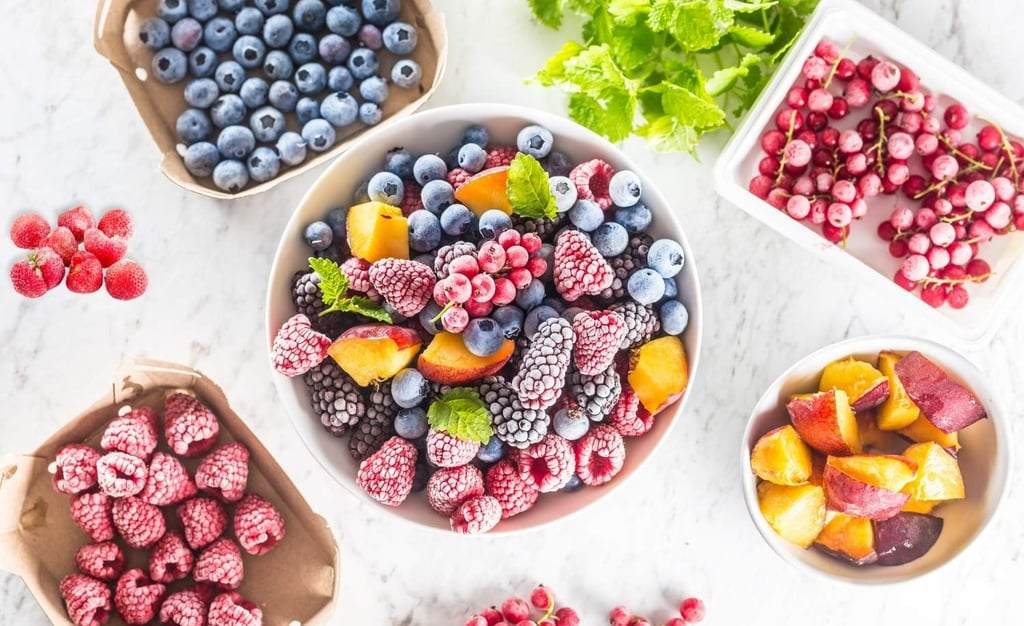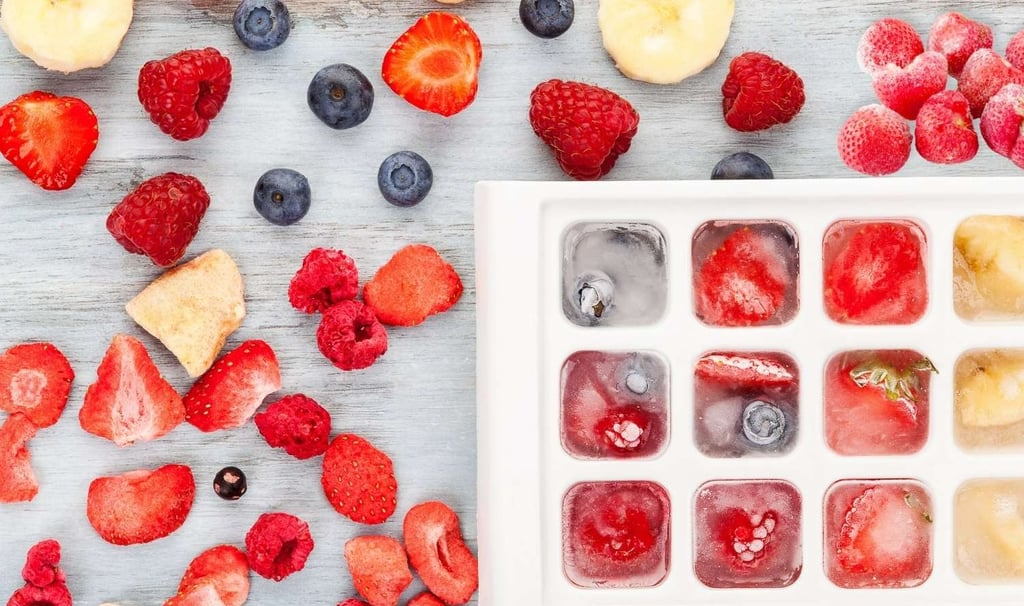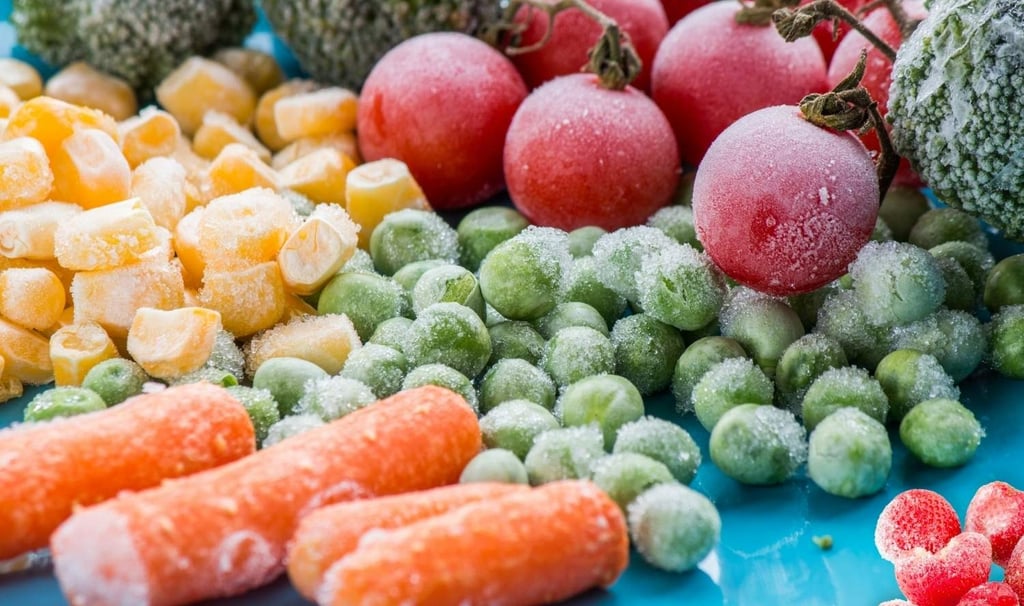Do Frozen Fruits and Vegetables Retain Their Health Benefits?
Frozen fruits and vegetables maintain their nutrients and can be just as healthy as fresh produce. Learn about their nutrient retention, health benefits, and uses.
11/10/20245 min read


Introduction: Frozen vs. Fresh – Are the Nutrients Still There?
Frozen fruits and vegetables have become pantry staples for many, offering convenience, extended shelf life, and affordability. Yet, a common question remains: do frozen fruits and vegetables retain their health benefits? As more consumers seek nutritious, fresh, and accessible food options, understanding the nutritional value of frozen produce compared to fresh produce is critical. Here, we examine the health benefits of frozen fruits and vegetables, their nutrient retention, and their impact on long-term health.
The Freezing Process and Its Impact on Nutrients
The journey from farm to freezer involves several steps designed to retain the freshness and nutrients of fruits and vegetables. Typically, produce selected for freezing is harvested at peak ripeness, a stage when nutrient levels are at their highest. Immediately after harvesting, they undergo a process known as blanching — a brief exposure to boiling water or steam — before they are flash-frozen at temperatures as low as -40°F (-40°C). This rapid freezing process helps maintain the texture, flavor, and nutritional profile of the produce.
Blanching, although essential to kill bacteria and prevent enzymatic reactions, can cause slight losses in some heat-sensitive vitamins like vitamin C and certain B vitamins. However, studies have shown that these losses are often minor and comparable to the natural decline in nutrients seen in fresh produce during transit and storage.
Comparing Fresh and Frozen: Nutrient Retention
Vitamin C
Vitamin C, a powerful antioxidant crucial for immune function and collagen synthesis, is often sensitive to heat and light. Fresh fruits and vegetables experience a gradual decline in vitamin C content as they sit on supermarket shelves. In contrast, frozen produce may retain higher levels of vitamin C, particularly if stored properly.
Antioxidants and Polyphenols
Antioxidants like beta-carotene, lutein, and anthocyanins are essential for combating oxidative stress and promoting cell health. Research shows that the freezing process generally preserves these compounds effectively, with minimal loss. In some cases, frozen produce may even exhibit higher antioxidant levels compared to fresh items stored at room temperature or in refrigerators for prolonged periods.
Fiber and Minerals
Fiber and minerals such as potassium, calcium, and iron are typically unaffected by the freezing process. Since these nutrients are stable and do not degrade easily, frozen fruits and vegetables remain a valuable source of dietary fiber and essential minerals.
Frozen Produce vs. Fresh Produce in Nutrient Quality
For individuals who prioritize nutrient density in their diets, both frozen and fresh fruits and vegetables offer unique advantages. Fresh produce is ideal when sourced locally and consumed shortly after harvest, retaining its vibrant flavors and nutrients. However, produce that undergoes lengthy transportation and storage often loses a significant portion of its vitamins, particularly vitamin C and folate.
On the other hand, frozen produce retains its nutrient quality over time, providing a reliable source of vitamins, minerals, and antioxidants. This makes frozen fruits and vegetables a practical option for those without immediate access to fresh, high-quality produce or who seek to reduce food waste.
Health Benefits of Frozen Fruits and Vegetables
1. Improved Accessibility to Nutrients
Frozen fruits and vegetables are available year-round, regardless of seasonality. This provides people worldwide with a consistent supply of nutrient-rich foods that would otherwise be inaccessible. From a health perspective, incorporating frozen produce into daily meals ensures a steady intake of vitamins, minerals, and antioxidants.
2. Reduced Food Waste
The extended shelf life of frozen produce plays a significant role in reducing food waste, a major contributor to global greenhouse gas emissions. Unlike fresh fruits and vegetables that may spoil within days, frozen produce can last for months in the freezer without losing its nutritional integrity. This makes it an eco-friendly choice for environmentally conscious consumers.
3. Cost-Effective and Budget-Friendly Nutrition
Buying fresh produce can sometimes be costly, particularly when certain fruits and vegetables are out of season. Frozen produce is often more affordable and accessible, making it an economical choice for families and individuals. By offering budget-friendly, nutrient-dense options, frozen fruits and vegetables make a balanced diet achievable for a wider range of consumers.
Myths and Facts about Frozen Produce
There are several myths surrounding frozen fruits and vegetables, which can cause confusion about their role in a nutritious diet. Below, we clarify some common misconceptions:
Myth: Frozen fruits and vegetables are inferior to fresh ones in nutritional quality.
Fact: Studies show that frozen produce can be just as nutritious, if not more so, than fresh produce stored for several days.
Myth: The freezing process strips fruits and vegetables of their natural flavors.
Fact: Flash-freezing preserves the natural flavors, textures, and colors of fruits and vegetables, allowing them to taste almost as fresh as the day they were harvested.
Myth: Frozen produce contains harmful additives.
Fact: Most frozen fruits and vegetables are additive-free. Unlike canned produce, which may contain added salt or sugar, frozen produce is typically just the fruit or vegetable itself, free from preservatives.
How to Incorporate Frozen Fruits and Vegetables into a Healthy Diet
Incorporating frozen fruits and vegetables into daily meals is both simple and versatile. Below are some ideas to help make the most of frozen produce:
Smoothies: Frozen fruits like berries, mangoes, and bananas are excellent additions to smoothies. They provide a rich source of vitamins, fiber, and antioxidants while enhancing the drink's texture and flavor.
Soups and Stews: Vegetables such as spinach, peas, carrots, and corn can be added directly from the freezer to soups and stews. This makes meal preparation faster and helps maintain nutrient density.
Stir-Fries: Frozen vegetables, including broccoli, cauliflower, and bell peppers, work well in stir-fries. Their rapid cooking times and nutrient stability make them ideal for quick, nutritious meals.
Baking: Frozen fruits like blueberries, raspberries, and cherries can be used in baking without thawing. Adding them to muffins, breads, and desserts boosts the fiber and antioxidant content of these treats.
Conclusion: Frozen Produce as a Nutritious and Sustainable Choice
In conclusion, frozen fruits and vegetables provide a nutrient-rich, accessible, and affordable alternative to fresh produce. The freezing process retains most vitamins, minerals, and antioxidants, making frozen produce a reliable option for maintaining a balanced diet. From a health and environmental perspective, choosing frozen fruits and vegetables contributes to reduced food waste, better accessibility to nutrients, and a more cost-effective way to eat well year-round.
As modern consumers prioritize convenience and nutrition, frozen produce stands out as an effective solution that meets these needs without sacrificing quality or health benefits. Embracing the health benefits of frozen fruits and vegetables enables us to make informed, nutritious choices that support our well-being and the planet.




Pure Vegan Path
Explore plant-based living and delicious recipes.
Contact
Newsletter
info@pureveganpath.com
123-456-7890
© 2024. All rights reserved.
